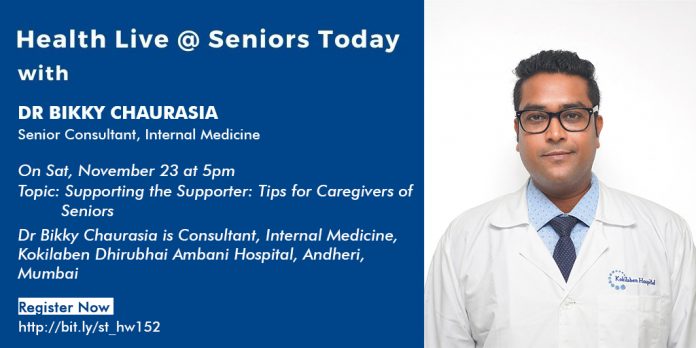Dr Bikky Chaurasia is a Consultant in the Internal Medicine Department at the Kokilaben Dhirubhai Ambani Hospital, Andheri, Mumbai. He has completed his M.B.B.S from MUHS, Nasik and his Master’s degree in Internal Medicine from SBKS, Vadodra. He has also done Fellowship in Critical Care Medicine from renowned hospital Mumbai. Along with this he is also a certified Diabetologist (CCEBDM) and Infectious disease specialist(Hinduja Hospital). His practice of interest is diabetes, thyroid disorders, critical care, infectious diseases, Geriatric disorders, etc
As we approach the age of 60 and beyond, we enter the group of senior citizens which means that we also need some help from our family and friends to perform our daily activities. Which is why the people who take care of the seniors are performing an important task and every now and then, they too need to be taken care of.
Caring for the elderly has 3 aspects:
- Caring for them mentally
- Caring for them physically
- Dealing with the resistance is occasionally, due to their own commitments, personal physical ailments or any other reason the caregiver might not be in a position good enough to take care, but due to either personal or family obligation, has to.
And while you’re doing all of that for your loved ones, you too need to take care of yourself mentally, physically.
Caregiving, though a rewarding action, can occasionally be stressful too for the caregiver.
The only and highly prized reward for caregiving is the feeling of having helped your loved ones and thereby helping make their relationship and bond become stronger.
But the demands of caregiving can also cause physical and emotional stress. Which is why it is absolutely normal to feel angry, frustrated, worn out and sad. And in such situations it is also normal to feel alone.
Carrying this stress can also lead to determent in the caregivers own health.
Concerns that can affect the caregiver:
- Anxiety, depression
- Irritability
- Interrupted sleep or insomnia
- In the process of taking care of their loved ones, the caregiver might occasionally not be able to focus on his own health, this can lead to progression and worsening on some underlying comorbidities, if any
- Difficulty concentrating on own work/ job
- Due to the stress of caregiving, the caregiver might resort to bingeing habits which can include binge eating, drinking, smoking, etc.
Caregivers stress can present as:
- Easy irritability
- Palpitations
- Losing their temper easily
- Constant worry
- Experiencing periods of high blood pressure
- Grinding of teeth at night
- Difficulty sleeping
- Being forgetful, having trouble concentrating
Signs of caregiver burnout:
- Being frequently late for work
- Decreased sexual desire
- Loss of energy
- Withdrawal form energy
- Excessive drinking and smoking
- Becoming apathetic
- Feeling of hopelessness, meaninglessness
- Acid reflux
- Frequent headaches
- Thoughts of suicide and escape
Complications of caregiver burn out:
- Poor health
- Infrequent visits to hospital for personal health concerns
- Addictions
- Depression and anxiety
Factors that can increase the caregivers stress include:
- Caring for a spouse along with the senior
- Being with someone who requires constant care
- Not having any support system or social circle of their own
- Financial problems
- Not getting adequate guidance from health care professional
- Not having adequate problem solving skills
Tips to manage and avoid caregiver stress:
- Ask and accept help
- Delegate small tasks to others
- Make lists of tasks that need to be done
- Break larger tasks into smaller manageable tasks
- Priorities important tasks
- Maintain and follow a routine/ schedule
- Focus on what you can and are doing. Believe that you are providing the best care that you can
Ways to avoid caregiver stress and fatigue:
- Practice yoga
- Meditation
- Exercise regularly at least 5 times a week
- Eat healthy and balanced diet
- Get quality sleep
- and rest. Quality of sleep is more important that quantity
- Sign up for support groups
- Set your goals, which can be emotional, personal or financial goals
Things to keep in mind while providing care to seniors:
- Do what you’re doing with love for those you love
- Keep an eye on their physical and mental health
- Ensure that they take their medications on time
- Ensure that they get adequate sleep and rest
- Help them to the bathroom and also help them taking a bath, if need be
- Ensure proper nutrition and diet
- Discuss finances with them as well
- Either cook meals or make sure that you have them together
- Consider old age homes if you are unable to provide the care you think they need.



